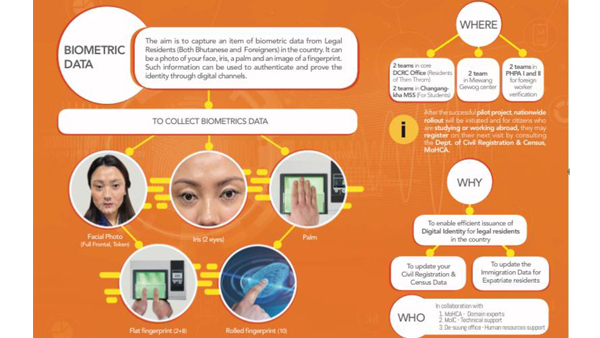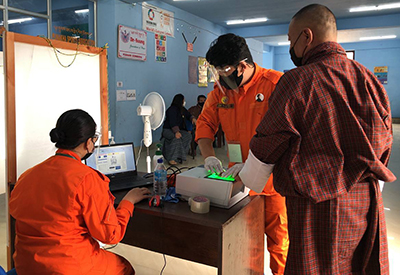 If everything goes as planned, individuals can expect better online services by the end of the current Five Year Plan. This will be made possible through the National Digital Identity project. Individuals will be given a unique digital identity based on biometric information. It is one of the major components of the government’s Digital Drukyul Flagship programme.
If everything goes as planned, individuals can expect better online services by the end of the current Five Year Plan. This will be made possible through the National Digital Identity project. Individuals will be given a unique digital identity based on biometric information. It is one of the major components of the government’s Digital Drukyul Flagship programme.
 Des-suups have been collecting biometric data of some office-goers in Thimphu since April this year. Biometric data include facial scans, fingerprints and palm scans. So far, in the pilot phase, the team has collected biometric information of more than 17,500 individuals.
Des-suups have been collecting biometric data of some office-goers in Thimphu since April this year. Biometric data include facial scans, fingerprints and palm scans. So far, in the pilot phase, the team has collected biometric information of more than 17,500 individuals.
The project will issue digital identities such as digital signature and biometric information to every individual. The users can then use their unique individual identity to authenticate while accessing online services. They can use the online services without having to visit the office of the service providers.
“So once we have that unique identity identifier for every resident then it will help in providing the online services. The identifier will be used by every individual who wants to avail themselves of online services. When the service provider verifies the authenticity they will use multiple combinations of biometric information. Sometimes they will use facial scan with the finger and sometimes a combination of finger and palms,” said Sonam Penjor, the Head of the Application Management Division under the Department of Information Technology and Telecom at the MoIC.
He added that currently, people have to visit offices in person as most of the G2C services are not fully online.
“G2C service has been initiated somewhere in 2011 to automate the services and move from the manual to online process. So when we move from manual to online, the citizens end up either going to the office in the middle of availing the services or end up submitting hard copies of documents. So the majority of the G2C services are online but they are not integrated end-to-end. So we could not provide end-to-end services till date because of lack of digital identity”.
The Department of Information Technology and Telecom, Department of Immigration, Department of Civil Registration and Census are implementing the project with support from the De-suups. They plan to begin the nationwide rollout soon.
“Initially it was planned to be carried out from May right after we finish the piloting. But somehow it got delayed because of the impacts of the lockdowns. We were instructed that until we have our second jab of the COVID-19 vaccine, it may not be safe to do the initiative which requires the involvement of huge citizens. Because of that, we kept on doing the piloting in a very controlled environment following all the health protocols. Now, since we have almost successfully completed the second jab, we proposed to the steering committee. Tentatively, we proposed to start from September but we haven’t got any approval as of now,” he added.
He said the National Digital Identity will become a core platform for services that will require authentication of identity in the country. It will be implemented as a government platform to be used by all government agencies that provide such services.
Phub Gyem








